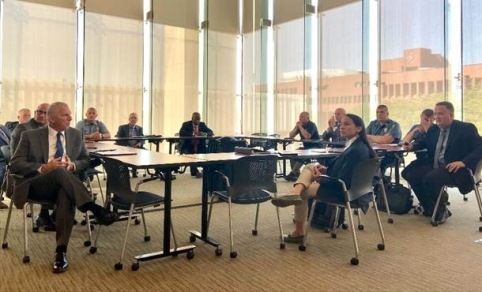
U.S. Rep. Sharice Davids, D-3rd Dist., took several actions recently to curb the growing threat of fentanyl, the number one cause of overdose death in the United States.
In August, Rep. Davids held a summit with local, state, and federal law enforcement on the challenges they face handling the fentanyl epidemic. The actions announced this week are a direct response to what she learned during that conversation.
“When I hosted a summit with law enforcement on the rising threat of fentanyl, I committed to working with them to fight this crisis head-on,” Rep. Davids said in a news release. “The actions I am taking today are a continuation of that promise, but we still have a long way to go. I am grateful for our local law enforcement officials and will continue working to ensure they have the resources needed to keep our communities safe.”
“The procurement of naloxone kits for law enforcement would greatly benefit the people of Overland Park, as well as adding an extra layer of protection for the men and women of the Overland Park Police Department who are on the front lines battling this fentanyl epidemic,” said Frank Donchez, chief of police, city of Overland Park.
During the summit, law enforcement expressed concern over the high cost of purchasing and handling naloxone kits, a Food and Drug Administration (FDA) approved medication designed to rapidly reverse opioid overdose. Street-level personnel who work in pairs are often issued a single dose each to administer for multiple overdoses, and these kits are often stored in vehicles, risking their effectiveness due to irregular temperatures. In response, Davids urged the U.S. House Appropriations Committee to increase the availability and affordability of this life-saving medication.
Following the summit, Davids also cosponsored two pieces of legislation aimed at fighting the fentanyl epidemic. First, she signed onto the Protecting Kids from Fentanyl Act, a bipartisan bill aimed at allowing schools to use leftover COVID-19 relief dollars to purchase naloxone and provide related training to students and teachers. She also sponsored the Integrating New Technologies to Empower Law Enforcement at Our Borders Act, a bipartisan bill to enhance security at northern and southern borders through researching and employing new technologies.
Summit attendees included leadership from the Overland Park, Olathe, and Kansas City, Kansas, Police Departments, as well the Kansas Highway Patrol, Kansas Bureau of Investigation, and the Drug Enforcement Administration.
Davids recently met with Libby Davis, a Johnson County resident, whose son died last year after taking a counterfeit pill that was unknowingly laced with fentanyl. Fentanyl is a synthetic opioid that is 80-100 times stronger than morphine and is increasingly found in fake prescription pills such as Vicodin, OxyContin, or hydrocodone. Following their meeting, Davids co-sponsored and helped pass legislation through the House that creates a public awareness campaign about synthetic opioids through the Department of Health and Human Services.
Community members looking to learn more about how to keep their families safe can visit FirstCallKC, www.firstcallkc.org, a local organization working to reduce the impact of alcohol, drugs, and addiction in the Kansas City area. Resources and prevention services for individuals, families, schools and others are available on their website.
